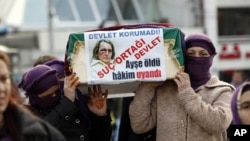The Turkish government is under growing pressure to stem domestic violence. According to the last official figures in 2009, 953 women were murdered in Turkey, most of them by their husbands. But, a growing public outcry is forcing the government into action.
"We have had enough," thousands of women chanted as they protested domestic violence Sunday in the heart of Istanbul.
One protester was on the verge of despair.
"Last week my neighbor was violently killed together with her son in a fire set by her ex-husband," she said. "I cannot understand how these murders of women by men whom they trusted the most, whom they loved the most, can be explained."
Another woman also expressed her anger. She says she lived through abuse for six years until she left her husband. She adds she still experiences problems from time to time, but the state does not have any preventive measure against it.
This past weekend two women killed by their husbands made headlines again. A man was arrested in the city of Konya, accused of shooting his wife and her father, after the wife fled their home when her husband returned with a second wife. Polygamy is illegal in Turkey, but remains common. Another man shot his wife dead in front of their child and then committed suicide.
Activist Pinar Ilkkaracan, of the Turkish rights group Women for Women's Human Rights, says the problem is getting worse.
"There are at least two or three murders like that each day, which you can read about in the newspapers," Ilkkaracan said. "It seems there is an increase on violence against women, and murders are actually only the tip of the iceberg. The major reason why there is an increase [is] because Turkey is lagging behind in establishing gender equality."
Earlier this year, the Turkish Interior Ministry issued its latest figures for the number of women murdered, showing a 1,400 percent increase from 2002 to 2009. Experts say some of that increase can be explained by improved statistics and better reporting of such crimes, although there is a wide consensus the situation is getting worse.
The European Union, which Turkey is seeking to join, is pressing Ankara to do more on women rights and in particular domestic violence. Turkish President Abdullah Gul has added his voice to the growing call for action, by setting up a presidential investigation into the problem.
Last week, new minister for family affairs, Fatma Sahin, said both legal and practical steps will be taken to improve the situation.
"We are increasing the authority of the police force in this matter and the family courts will be given more authority," she said. "But most importantly courts will have the power to force men who have been expelled from [their] homes because of domestic violence to wear electronic tags so police can monitor their movements, a method used by some European countries."
But critics say the problem does not lie in legislation, but in implementation.
"There is a credibility gap," said Gauri van Gulik, who authored a report this year on domestic violence in Turkey for the U.S.-based Human Rights Watch. "On one hand, you have this amazing progress in terms of legislation, so you have the penal code reform, the civil code reform. They have set this system of protection in principle in law. On the other hand, none of that is implemented properly. So women cannot count on getting the protection they need, even in the most horrific circumstances. We have cases [in which] the police just turned them away [saying], 'Go back to your husband.'"
But today there is an increasingly powerful women-rights movement, that is backed by an outraged Turkish media, all of this is now putting the government under acute pressure to end the slaughter of women.
Turkey Takes Steps to Stem Violence Against Women
- By Dorian Jones










